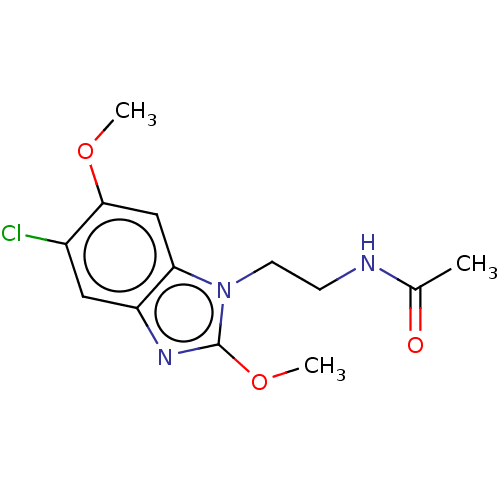BDBM463447 US10781182, Compound IA2-143::US11091445, Compound code IA2-143
SMILES COc1nc2cc(Cl)c(OC)cc2n1CCNC(C)=O
InChI Key InChIKey=BVSLRGAPRGQWNC-UHFFFAOYSA-N
Activity Spreadsheet -- Enzyme Inhibition Constant Data from BindingDB
 Found 9 hits for monomerid = 463447
Found 9 hits for monomerid = 463447
Affinity DataKi: 0.800nMAssay Description:Displacement of 2-[1251]-iodomelatonin from human MT2 receptor expressed in CHO cells incubated for 120 mins by scintillation counting analysisMore data for this Ligand-Target Pair
Affinity DataKi: 0.800nMAssay Description:The binding assay was performed in melatonergic MT1 and MT2 receptors in order to check the receptor affinity for the ligand, i.e., the ability of th...More data for this Ligand-Target Pair
Affinity DataKi: 0.800nMAssay Description:The binding assay was performed in melatonergic MT1 and MT2 receptors in order to check the receptor affinity for the ligand, i.e., the ability of th...More data for this Ligand-Target Pair
Affinity DataKi: 2.10nMAssay Description:The binding assay was performed in melatonergic MT1 and MT2 receptors in order to check the receptor affinity for the ligand, i.e., the ability of th...More data for this Ligand-Target Pair
Affinity DataKi: 2.10nMAssay Description:The binding assay was performed in melatonergic MT1 and MT2 receptors in order to check the receptor affinity for the ligand, i.e., the ability of th...More data for this Ligand-Target Pair
Affinity DataKi: 2.10nMAssay Description:Displacement of 2-[1251]-iodomelatonin from human MT1 receptor expressed in CHO cells incubated for 60 mins by scintillation counting analysisMore data for this Ligand-Target Pair
Affinity DataEC50: 0.0630nMAssay Description:Agonist activity at human MT1 receptor expressed in CHO cells assessed as increase in forskolin induced cAMP production incubated at 37 degreeC by Hi...More data for this Ligand-Target Pair
Affinity DataEC50: 0.860nMAssay Description:Agonist activity at human MT2 receptor expressed in CHO cells assessed as increase in cAMP production incubated at 37 degreeC by fluorometric methodMore data for this Ligand-Target Pair
Affinity DataEC50: 0.25nMAssay Description:Agonist activity at human MT1 receptor expressed in CHO cells assessed as increase in cAMP levels incubated at 28 degreeC by cellular dielectric spec...More data for this Ligand-Target Pair
